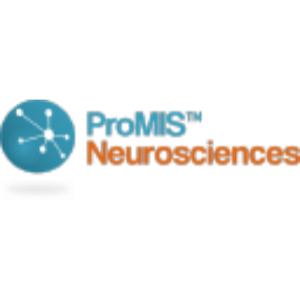ProMIS Neurosciences Receives DSMB Approval to Advance to Final Dose Escalation Cohort in Phase 1b Alzheimer’s Trial of PMN310
Rhea-AI Summary
ProMIS Neurosciences (NASDAQ: PMN) has received approval from its Data and Safety Monitoring Board (DSMB) to advance to the final dose escalation cohort in its Phase 1b PRECISE-AD clinical trial of PMN310 for Alzheimer's disease treatment. The trial has shown no cases of amyloid-related imaging abnormalities (ARIA) to date through Cohort 2.
The study, designed to enroll 128 patients, is proceeding from 10 mg/kg to 20 mg/kg dosing in the final cohort. The company remains on schedule to report 6-month interim data in Q2 2026 and 12-month top-line results in Q4 2026. PMN310 is specifically engineered to target toxic oligomers while avoiding amyloid plaque, potentially offering a safer treatment approach for Alzheimer's disease.
Positive
- No cases of amyloid-related imaging abnormalities (ARIA) observed to date, indicating favorable safety profile
- Trial progressing on schedule with all planned milestones
- Recently received FDA Fast Track designation for PMN310
- Large trial size of 128 patients provides robust dataset for analysis
Negative
- Final trial results not expected until Q4 2026
- Still in early Phase 1b stage of development
News Market Reaction
On the day this news was published, PMN declined 14.76%, reflecting a significant negative market reaction. Argus tracked a peak move of +31.7% during that session. Argus tracked a trough of -48.3% from its starting point during tracking. Our momentum scanner triggered 51 alerts that day, indicating high trading interest and price volatility. This price movement removed approximately $5M from the company's valuation, bringing the market cap to $28M at that time. Trading volume was exceptionally heavy at 82.4x the daily average, suggesting significant selling pressure.
Data tracked by StockTitan Argus on the day of publication.
Cohort 2 fully enrolled; enrollment and dosing now underway for Cohort 3 (final dose level);
No cases of amyloid-related imaging abnormalities (ARIA) observed to date;
The trial, expected to enroll 128 patients, remains on track to report 6-month interim data in Q2 2026 and final 12-month top-line results in Q4 2026.
Cambridge, Massachusetts, Sept. 03, 2025 (GLOBE NEWSWIRE) -- ProMIS Neurosciences, Inc. (Nasdaq: PMN), a clinical-stage biotechnology company developing next-generation therapies for Alzheimer’s disease (AD) and other neurodegenerative disorders, today announced that the independent Data and Safety Monitoring Board (DSMB) for its ongoing PRECISE-AD Phase 1b clinical trial has unanimously recommended that the Company proceed to the third and final dose escalation cohort in this trial of PMN310 for the treatment of AD. The recommendation followed a review of available safety data through Cohort 2, which has now been fully enrolled, with no cases of amyloid-related imaging abnormalities (ARIA) observed to date. Enrollment of patients into Cohort 3 is now underway, keeping the Company on track to deliver 6-month interim data in the second quarter of 2026 and final 12-month top-line results in the fourth quarter of 2026.
“The DSMB’s recommendation to proceed with the planned escalation to the final dose cohort underscores the steady progress of our Phase 1b program and keeps us firmly on track toward our planned interim and top-line data readouts in 2026,” said Neil Warma, President and CEO of ProMIS Neurosciences. “Together with the recent FDA Fast Track designation for PMN310, this achievement highlights the momentum we are building as we advance through clinical development. “Unlike therapies directed at amyloid plaque, which continue to be associated with safety concerns, PMN310 is engineered to avoid plaque and precisely target only toxic oligomers, the amyloid species most closely linked to neuronal damage and disease progression. The favorable safety profile observed to date highlights this differentiated strategy and reinforces the potential of PMN310 to meet a critical unmet need in Alzheimer’s disease.”
“The safety profile observed with PMN310 to date is encouraging and consistent with its design as a highly selective antibody targeting toxic oligomers,” said Larry Altstiel, M.D., Ph.D., Chief Medical Officer of ProMIS Neurosciences. “By potentially avoiding plaque and monomer binding, we believe PMN310 may reduce off-target effects and focus therapeutic activity on the molecular species most implicated in disease progression. As we enter the final cohort, we look forward to assessing a comprehensive biomarker panel, including pTau217, pTau243, neurofilament light chain (NfL), glial fibrillary acidic protein (GFAP), Abeta42/40 ratios and synaptic integrity markers such as SNAP25 and neurogranin, to provide critical insights into target engagement, neuronal injury, and potential disease-modifying effects. Importantly, this trial is designed to enroll 128 patients, providing a robust dataset across biomarkers, safety outcomes such as ARIA, and clinical measures that will inform the next phase of development.”
PMN310 is a humanized IgG1 antibody directed toward toxic amyloid-beta oligomers (AβOs) that are believed to be a major driver of AD. The DSMB recommended continuation of the trial as planned without any modification and provided clearance to continue the trial and proceed to the next and final dosing level, going from the 10 mg/kg dose of PMN310 in the second cohort to the 20mg/kg dose for the final cohort. The DSMB based its review on cumulative safety data for all patients in the current and prior cohort.
Neil Warma, President and CEO of ProMIS Neurosciences, will discuss our clinical progress along with other corporate updates at the upcoming H.C. Wainwright 27th Annual Global Investment Conference, taking place in New York, New York on September 10, 2025, at 12:30 p.m. Eastern Time.
The webcast of the presentation may be accessed by visiting the Events page of the Company’s website at www.promisneurosciences.com, and will be available for at least 30 days following the event.
About ProMIS Neurosciences Inc.
ProMIS Neurosciences is a clinical-stage biotechnology company committed to the discovery and development of therapeutic antibodies and vaccines selective for toxic oligomers associated with the development and progression of neurodegenerative and other misfolded protein diseases. The Company’s proprietary target discovery engine, EpiSelect™, has been shown to predict novel targets known as Disease Specific Epitopes (DSEs) on the molecular surface of misfolded proteins that cause neurodegenerative and other misfolded protein diseases, including Alzheimer’s disease (AD), amyotrophic lateral sclerosis (ALS), frontotemporal dementia (FTD), multiple system atrophy (MSA), and Parkinson’s Disease (PD). ProMIS has offices in Cambridge, Massachusetts (USA) and Toronto, Ontario (CAN).
About PMN310 and the PRECISE-AD Trial for Alzheimer’s Disease (AD)
PMN310, the Company’s lead product candidate for the treatment of AD, is a humanized monoclonal antibody that has been designed to selectively target only the toxic oligomers, avoiding plaque, thereby potentially reducing or eliminating ARIA liability. In addition, because PMN310 may not be limited by off-target binding or side effects, PMN310 could potentially offer an improved efficacy profile over other amyloid-directed antibody therapeutics. PMN310 was granted Fast Track designation by the U.S. Food and Drug Administration in July 2025.
Based on the encouraging results from the Phase 1a trial (NCT06105528) of PMN310, ProMIS initiated PRECISE-AD, a Phase 1b clinical trial in AD patients. PRECISE-AD (NCT06750432) is a randomized, double-blind, placebo-controlled study to evaluate the safety, tolerability and pharmacokinetics (PK) of multiple ascending doses (5, 10, 20 mg/kg) of intravenous PMN310 in patients with Mild Cognitive Impairment due to AD and mild AD (Stage 3 and Stage 4 AD). PRECISE-AD will be the first study to examine the effects of a monoclonal antibody directed solely against AβO on biomarkers associated with AD pathology and clinical outcomes. Safety will be a primary outcome of the study with particular emphasis on assessing whether, as a non-plaque binder, PMN310 may have a reduced risk of ARIA. The study is powered to provide
EpiSelectTM Drug Discovery Engine
Toxic misfolded proteins underlie the pathogenesis of neurodegenerative diseases such as Alzheimer’s disease, Parkinson’s disease (PD), amyotrophic lateral sclerosis (ALS) and frontotemporal dementia (FTD). Generation of therapeutic antibodies selectively targeting only disease-misfolded protein isoforms, while sparing normal or irrelevant isoforms of the same protein, has not yet been successfully achieved by conventional immunization strategies. ProMIS Neurosciences has developed a computational platform (EpiSelectTM) to identify conformational epitopes that are uniquely exposed on toxic misfolded proteins, which can then be used to generate misfolding-specific antibodies or vaccine formulations. Application of the ProMIS platform produced PMN310, a clinical stage, humanized monoclonal antibody candidate that has been shown to be highly selective for toxic amyloid-beta oligomers (AβO) without significant reactivity with amyloid-beta monomers or fibrils, thereby avoiding target distraction by these more abundant species, and potentially reducing the risk of brain edema and microhemorrhages associated with the targeting of vascular/parenchymal amyloid. Similarly, specific epitopes for alpha-synuclein toxic oligomers/soluble fibrils that drive synucleinopathies, and for pathogenic TDP-43 in ALS and FTD have been identified and lead candidate antibodies generated. The precise conformation of these epitopes has been translated into vaccines inducing an antibody response selective for pathogenic molecular species in preclinical mouse vaccination studies
Forward-Looking Statements
This press release contains forward-looking statements that are made pursuant to the safe harbor provisions of the Private Securities Litigation Reform Act of 1995. Certain information in this news release constitutes forward-looking statements and forward-looking information (collectively, “forward-looking information”) within the meaning of applicable securities laws. In some cases, but not necessarily in all cases, forward-looking information can be identified by the use of forward-looking terminology such as “plans”, “pleased to”, “look forward to”, “potential to”, “on track to”, “targets”, “expects” or “does not expect”, “is expected”, “excited about”, “an opportunity exists”, “is positioned”, “estimates”, “intends”, “assumes”, “anticipates” or “does not anticipate” or “believes”, or variations of such words and phrases or state that certain actions, events or results “may”, “could”, “would”, “might”, “will” or “will be taken”, “occur” or “be achieved”. In addition, any statements that refer to expectations, projections or other characterizations of future events or circumstances contain forward-looking information. Specifically, this news release contains forward-looking information relating to the Company's progress and expectations for its Phase 1b clinical trial in AD patients, including DSMB approval to advance to third and final dose escalation cohort, planned timing for completion and anticipated data readout of interim and full results in the second and fourth quarters of 2026, respectively, the potential for such studies to provide the first proof-of-concept data for PMN310, the possibility that PMN310 has the potential to positively benefit patients with AD and to be a more effective and well-tolerated option, the targeting of toxic misfolded proteins in neurodegenerative diseases that the Company believes may directly address fundamental AD pathology (including the belief and understanding that toxic oligomers of Aβ are a major driver of AD) and have greater therapeutic potential due to reduction of off-target activity and the Company’s computational platform, including the capabilities thereof and the application of its platform to other diseases. Statements containing forward-looking information are not historical facts but instead represent management's current expectations, estimates and projections regarding the future of our business, future plans, strategies, projections, anticipated events and trends, the economy and other future conditions. Forward-looking information is necessarily based on a number of opinions, assumptions and estimates that, while considered reasonable by the Company as of the date of this news release, are subject to known and unknown risks, uncertainties and assumptions and other factors that may cause the actual results, level of activity, performance or achievements to be materially different from those expressed or implied by such forward-looking information, including, but not limited to, the risk that clinical results or early results may not be indicative of future results, the Company’s ability to fund its operations and continue as a going concern, its accumulated deficit and the expectation for continued losses and future financial results. Important factors that could cause actual results to differ materially from those indicated in the forward-looking information include, among others, the factors discussed throughout the “Risk Factors” section of the Company's most recently filed Annual Report on Form 10-K for the year ended December 31, 2024 and in its subsequent filings filed with the United States Securities and Exchange Commission. Except as required by applicable securities laws, the Company undertakes no obligation to publicly update any forward-looking information, whether written or oral, that may be made from time to time, whether as a result of new information, future developments or otherwise.
For further information:
Visit us at www.promisneurosciences.com
Please submit media inquiries to info@promisneurosciences.com
For Investor Relations, please contact:
Kaytee Bock Zafereo
katherine.bock@promisneurosciences.com








